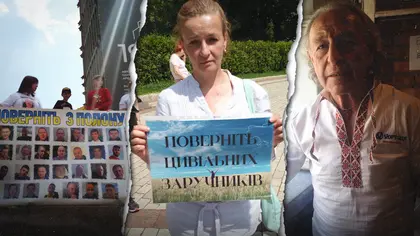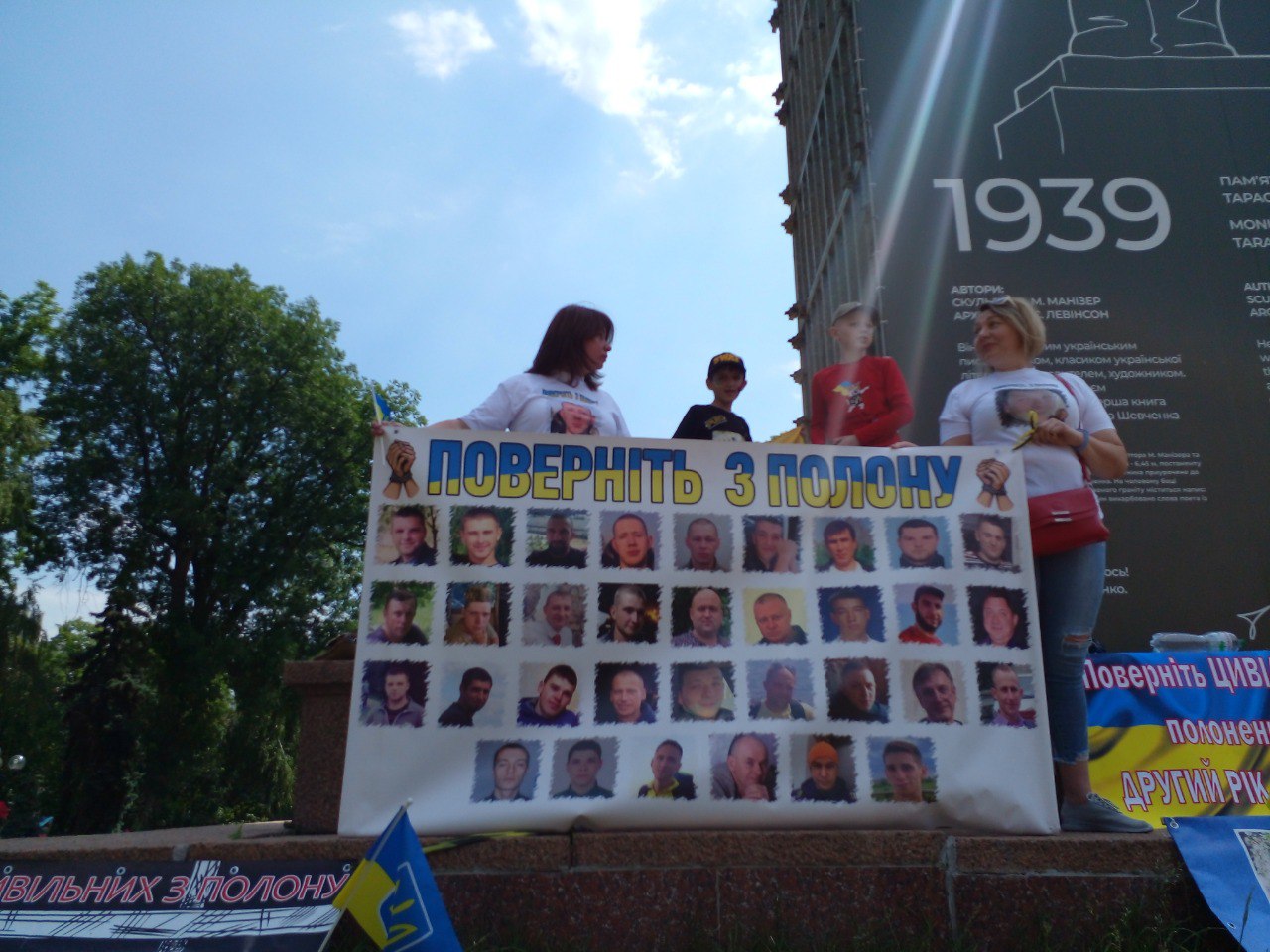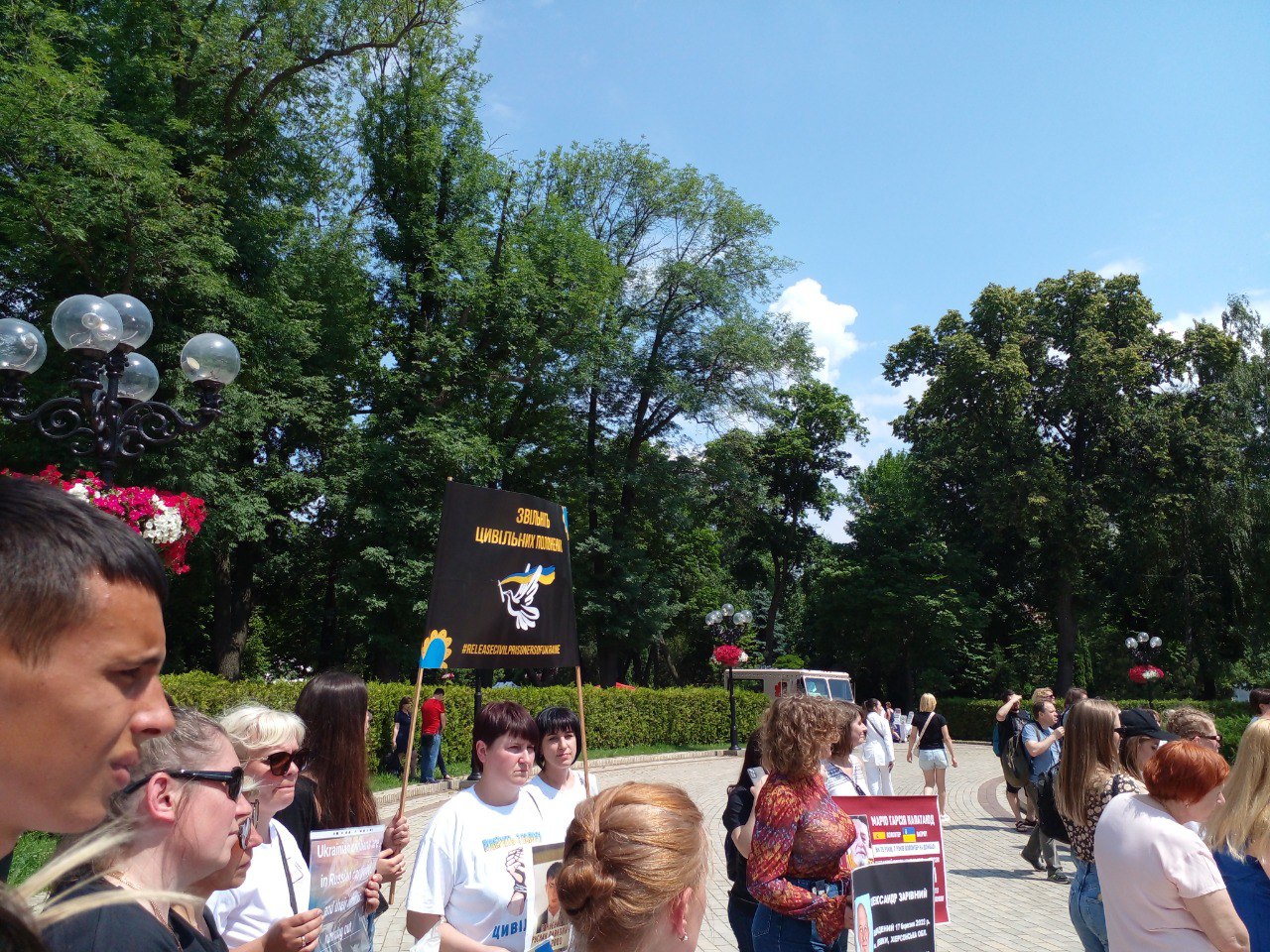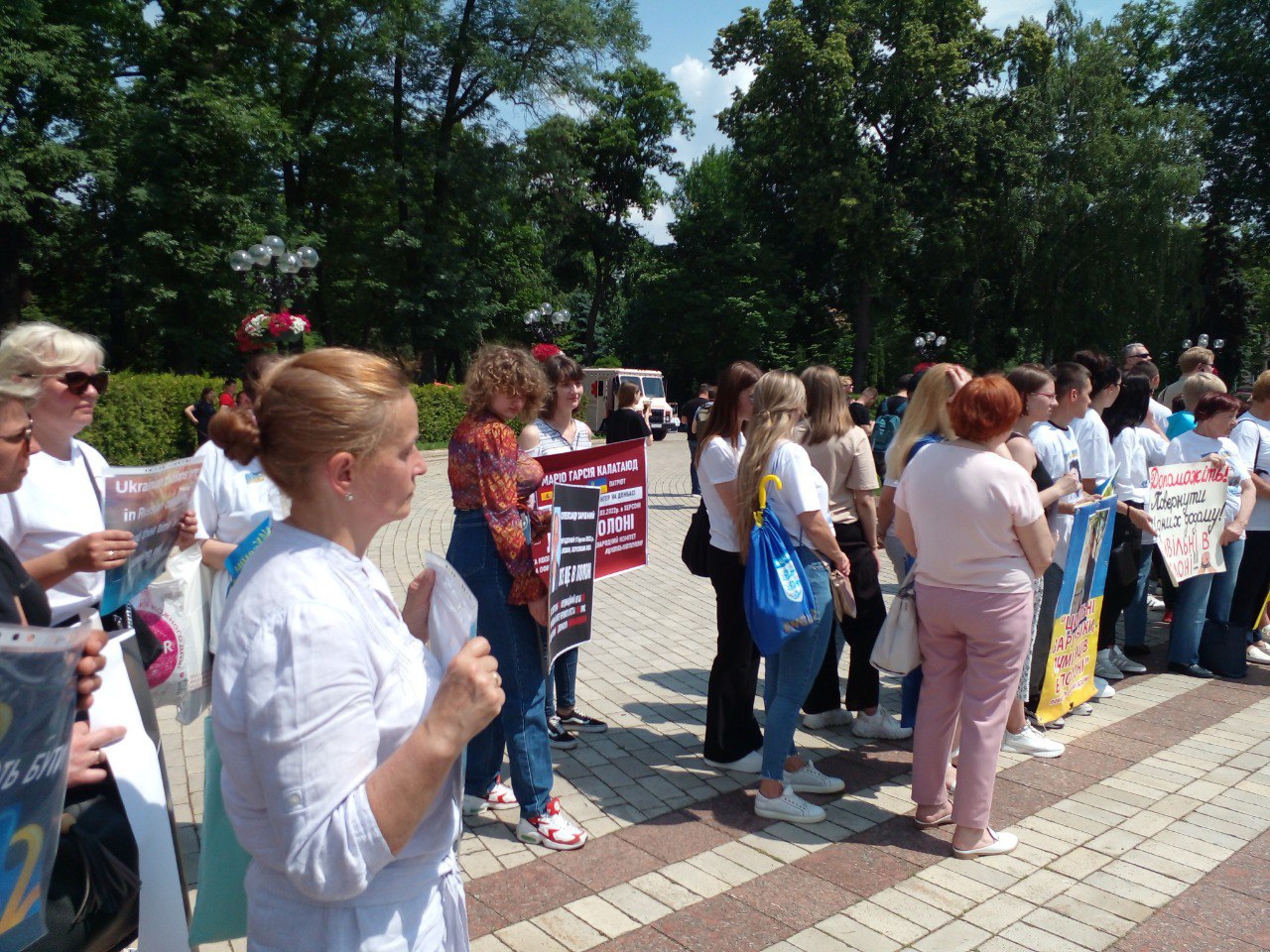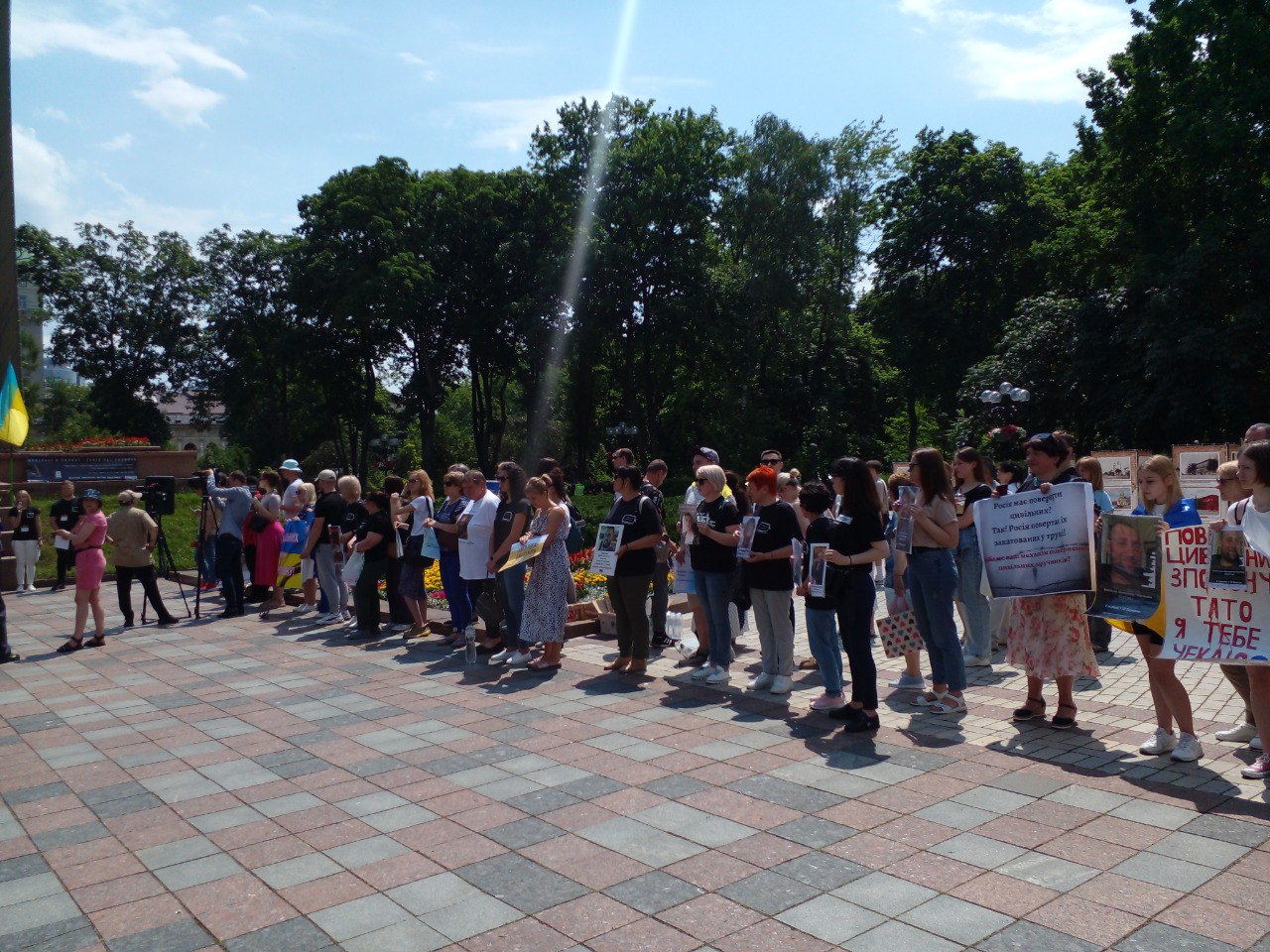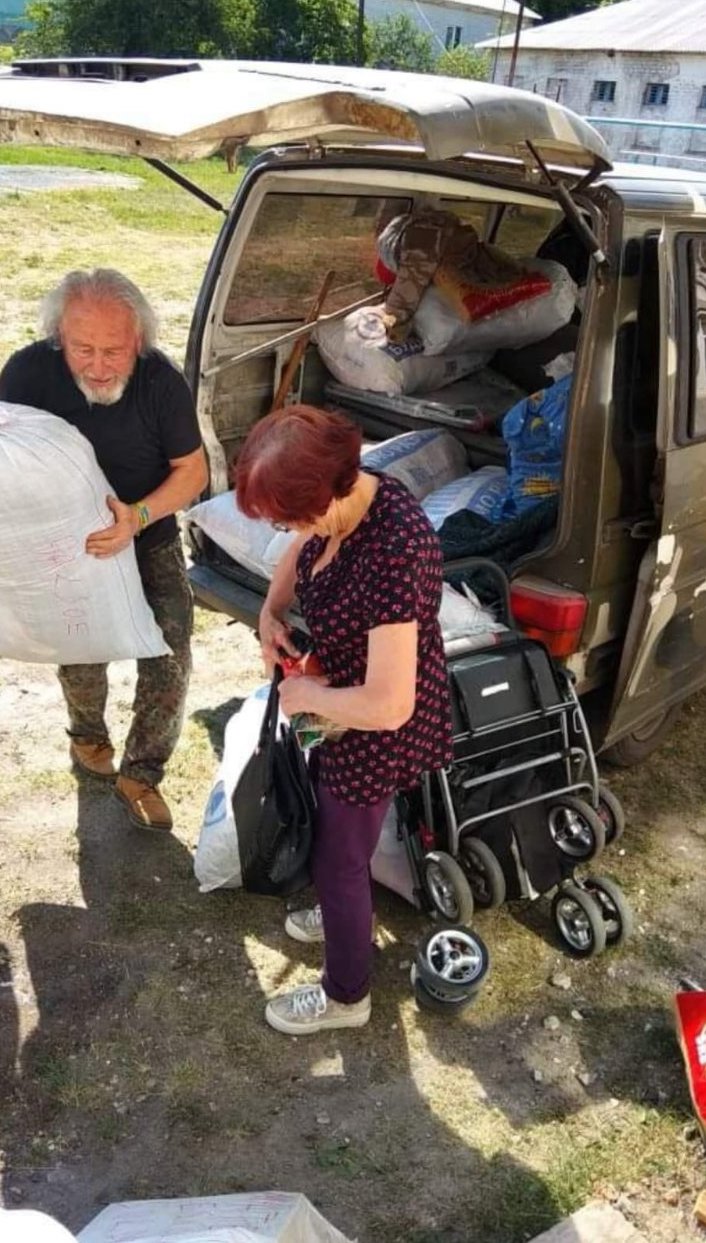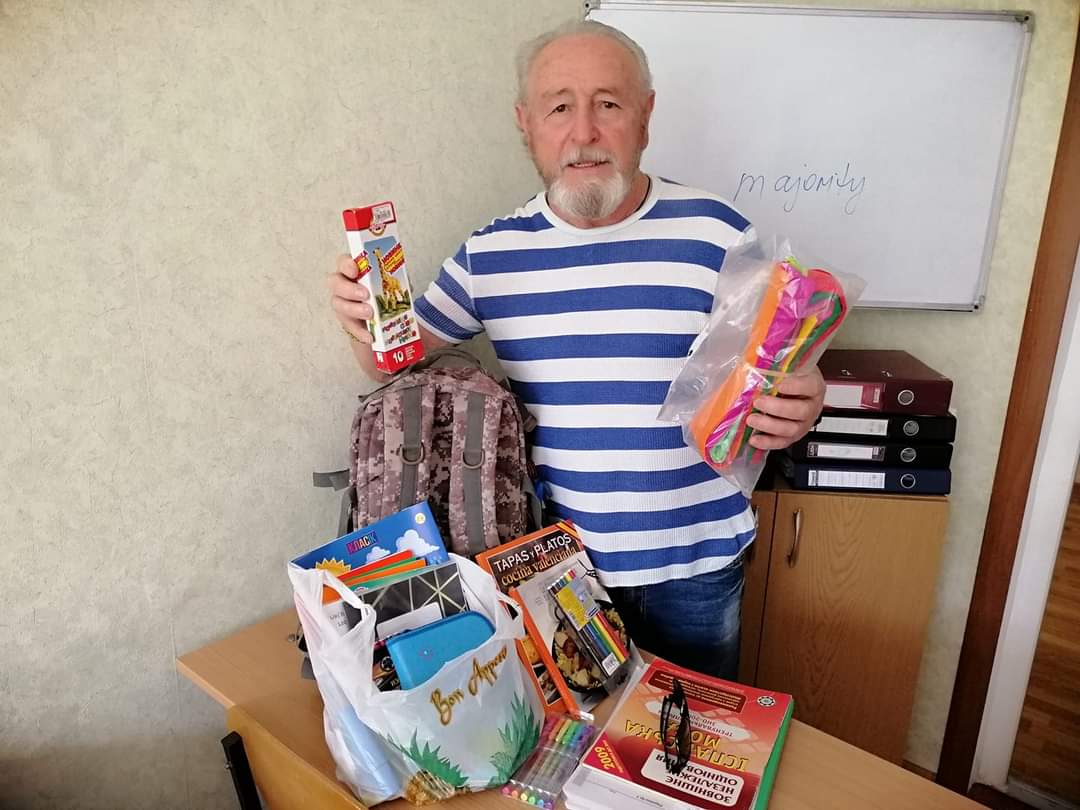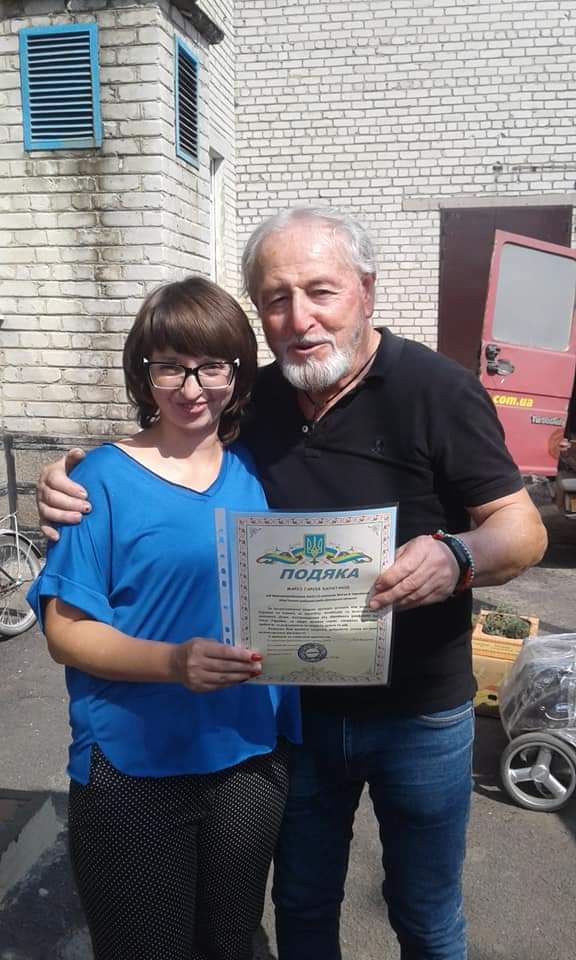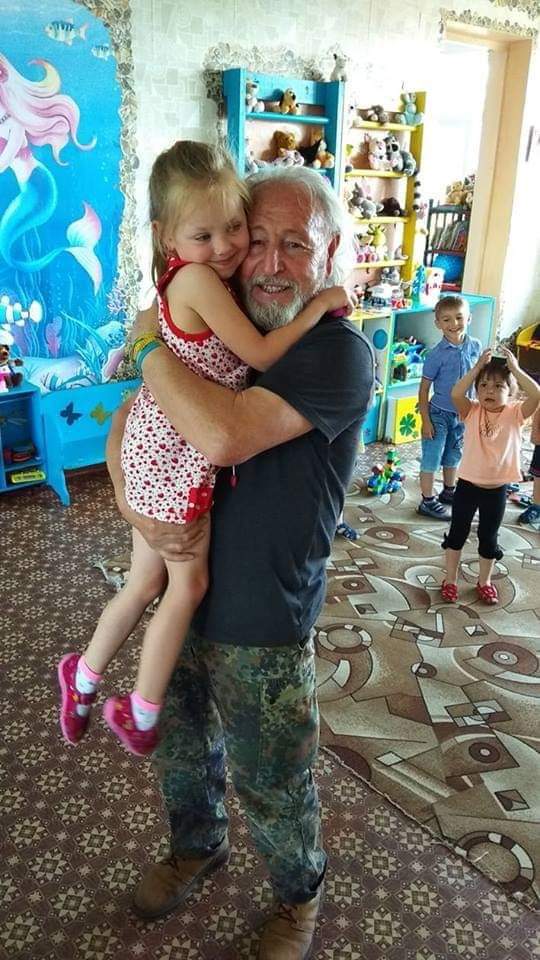Parents, spouses, brothers, sisters and children of civilian captives gathered in Kyiv’s Shevchenko Park on June 10 for a public rally to loudly remind the Ukrainian authorities and the international community that time for their illegally detained and imprisoned relatives is running out.
The event “Civilians in Captivity” saw numerous posters and banners as well as photos of captives which many participants held in their hands or wore on their T-shirts.
JOIN US ON TELEGRAM
Follow our coverage of the war on the @Kyivpost_official.
The event was attended by Dmytro Lubinets, Verkhovna Rada Commissioner for Human Rights who spoke for setting up a special government agency that would directly engage in the release of civilians from Russian captivity.
Arkadiy Dovzhenko, who took an active part in last year's anti-Russian protests in Kherson, spent a week in Russian captivity and was tortured each day. The occupiers broke his ribs and knee.
“I’m here to remind the world and the Ukrainian authorities about Iryna Horobtsova from Kherson who has been held by Russians for more than a year,” Dovzhenko told Kyiv Post.
“It happened very often in my beleaguered native Kherson when a bunch of armed orcs would break into a home and took people to a torture chamber,” said Dovzhenko.
Another participant in the rally, Zoya Shcherbinina, who also took part in the anti-Russian protests in Kherson, told Kyiv Post about her good friend and former university classmate Serhiy Arefyev. He has been held hostage since Russians abducted him in broad daylight on March 23, 2022.

Moscow Prime Suspect for Sabotage Aimed at Disrupting Olympic Games
“He just went shopping. When he was leaving the store, a car pulled up. Several Russian soldiers got out, put a sack on his head and took him away,” says Shcherbinina.
She cites a letter from Russian authorities which Arefyev's wife got a year after he was abducted: “The given person is in conditions precluding any threat to his health or life.” All that she knows about him is that he is held in Russia-occupied Simferopol, Crimea.
“His son is four and has just had a second birthday without his dad. Serhiy is a simple civilian. He just went to buy bread and some food for his son who hadn’t even turned three,” adds Shcherbinina.
The Russians are also holding Dovzhenko’s Spanish acquaintance, Mariano Garcia Calatayud, 75, an active civilian volunteer in the Donbas since 2014.
“He was the most fearless man at our protests. He inspired me and others. He stood next to me at the front of the crowd, holding a Spanish flag and facing the orcs. He just couldn’t stand aloof,” says Dovzhenko.
“I love Ukraine. I won’t leave here for anywhere.”
Mariano Garcia Calatayud has been in Russian captivity for 16 months since he was abducted on March 19, 2022.
His common-law wife Tetiana tells Kyiv Post that she has not received a single letter from him or any information about his whereabouts from Russian authorities. According to her, first he was held in Kherson, but soon was transferred to Detention Center #1 in Simferopol, and then to Detention Center #2.
“He had a chance to evacuate when the Spanish government organized evacuation of its citizens before February 24. He even had a chance to leave all the time until he was abducted,” says Tetiana.
“He traveled as a volunteer to the gray zone in the Donbas for seven years. He delivered clothes, foodstuffs and other aid there and helped orphanages. He often visited a kindergarten in Maryinka where he brought clothes and food. He didn’t want to leave Kherson and said, “I love Ukraine. I won’t leave here for anywhere.”
Mario took an active part in anti-Russian street protests in Kherson. He spoke neither Ukrainian nor Russian but always stood at the front. He lived next to the building of the Kherson region administration where he collected humanitarian aid.
Tetiana recalls that the day the Russians abducted someone they jammed the internet in the city. They took Mariano on his way back from a street protest rally.
“Nobody saw Mario’s abduction. He was only just at the front door and called me to come out and open it. I went out but he wasn’t there, and there was no phone or internet connection. And there was nobody outside. I couldn’t even let anyone know.”
It was only weeks later when someone told Tetiana that a blue van pulled up at her house and two men wearing balaclavas got out and grabbed the man. She says that she often saw that van driving around the city.
“The Spanish Red Cross tried to free Mario, but the Russians lied to them, saying he’d already been released,” says Tetiana.
One day, an ICRC representative said on TV that the activist was free and back home and had even fed his dog. Many Spanish media wrote about his release, though there was no confirmation from the embassy. From her conversations with the relatives of very many abducted people Tetiana knows that the Russians often lie, claiming they released people in order to make life harder for the captives and their relatives.
While in captivity, the 75-year-old man has been constantly tortured, and most brutally in Kherson, according to his common-law wife. When the Russians found his bank card, they tortured him, demanding the pin code. They wanted his money. The card was blocked, but they still tortured him with electric current.
The man who shared the cell with Mario in the Simferopol detention center told Kyiv Post that Mario complained that the torturers had drugged him.
“One day during a routine rollcall, a guard dog tore its teeth into his knee. The guard didn’t move a finger to stop it but just watched the scene and said, ‘Well, you fascist scum, it’s hurting, ain’t it?’ Mario couldn’t bear it anymore and punched the dog in the nose. He got beaten up for that. He’s got a big scar on his knee,” says Tetiana.
Now Mario is sharing a cell with Oleksandr Babych, the abducted mayor of Hola Prystan who has learned Spanish well enough to interpret for Mario.
“Luhansk Partisan”: civilians should be swapped for civilians
The rally in Shevchenko Park was also attended by Volodymyr Zhemchugov who is widely known in the media as “Luhansk Partisan.” He used to be an entrepreneur with a successful business in Georgia, but when the war broke out in the Donbas in 2014, he quit it and joined the underground resistance movement in the Luhansk region. He already has dozens of successful Kyiv-coordinated sabotages and other operations on his record.

Zhemchugov represents a volunteer organization that has been engaged in freeing political prisoners since 2014. He claims that [before Russia’s full-scale invasion] volunteers like him succeeded in freeing political prisoners without the government's help. In that period, there were a lot of detained, indicted and convicted pro-Russia collaborators and they were exchanged for Ukrainian civilians captured by Russians. Zhemchugov believes that it would be correct to exchange civilians for civilians, just like POWs for POWs. He regrets that the Ukrainian government abandoned this mechanism.
Zhemchugov is also convinced that the Ukrainian authorities should highlight Russian POWs and civilian detainees rather than Ukrainian ones in the media and thus take over initiative as they have access to the lists and personal data of captives and prisoners.
Dovzhenko is quite straightforward in criticizing the authorities: “How many civilians have they returned home since the full-scale invasion? Just a few. But according to official data, the Russians hold 27,000 and everybody understands that the actual number is higher.”
Dovzhenko is skeptical about the Ombudsman’s advice to picket embassies. He doubts it will help much.
“It’s too bad they don’t use these mechanisms [mentioned by Luhansk Partisan] that have already helped to free our civilians. Time flies and our people are slowly petering out in Russian concentration camps while the UN, the OSCE, the Red Cross and even the Pope keep expressing their ‘deep concern’,” says the Kherson activist.
What does the Red Cross say?
Oleksandr Vlasenko, ICRC spokesman for Ukraine, explained to Kyiv Post that this organization has no authority to influence the sides exchanging civilian prisoners.
“We have no leverage. If a state does not comply with the norms of the Geneva conventions, other states are supposed to pressure it for compliance,” says Vlasenko.
“That’s a matter of dialog between states which is supposed to be equal, but we are a humanitarian organization. We don't have the weight to put pressure on either. Even other states don't have any mechanism of pressure. All they can do is persuade. We are doing the best we can to persuade [the Russians], we have meetings at the highest level, but they may just as well turn a deaf ear,” adds the ICRC spokesman.
According to him, in the process of returning POWs and civilian hostages the ICRC acts within its competence which is clearly delimitated in the Geneva conventions. Under the Geneva-based Central Tracing Agency, each side has established the National Information Bureau to accumulate information on military and civilian detainees. In every case when the Ukrainian side sends an inquiry to another state's bureau, it is required to provide information on the detainee in question.
For example, the Defense Ministry notifies a person’s relatives that the person is deemed missing. In that case they can turn to the ICRC and fill out a detailed form, because the more information they provide the easier it is to find a missing person. The form with the person's correctly spelled name and date of birth and other personal data is then forwarded to the Central Tracing Agency where the case is automatically registered under an entry number. With that number relatives can receive available information.
“The rule is like this: when relatives turn to us, we register the case with the National Tracing Agency and send the information to Russia’s National Information Bureau, requesting information on the fate and whereabouts of the missing person. If we receive their reply, we immediately let the relatives know. Three weeks ago, we received several hundred replies from the Russian bureau. Prisoners of war probably make up the majority there, but there are also civilians,” says the Ukrainian ICRC spokesman.
Having located the prisoner, the ICRC informs the relatives who opened the case and Ukraine's National Information Bureau. Then the ICRC sends a request to the Russian bureau to visit the detained person. However, the Russians may turn down or simply ignore the request, although the Geneva conventions prohibit restricting access of Red Cross volunteers to prisoners without a good reason.
“Civilians are hostages. Russia must return them unconditionally”
Ukraine’s Ombudsman Dmytro Lubinets told Kyiv Post in a comment that the 4th Geneva Convention prohibits taking civilians hostage.
“Civilians cannot be exchanged for civilians. The Ukrainian side abides by the Geneva conventions and norms of international humanitarian law and does not take civilians hostage,” notes Lubinets, pointing to the different statuses of prisoners of war and civilians.
“They are entirely different categories. Let me stress that civilians are hostages and the Russian Federation must return them unconditionally rather than include them in the swap lists of prisoners of war! The swaps must be in the 'military for military' format,” says Lubinets, assuring Kyiv Post that his Office is considering all possible mechanisms that could help Ukraine return its citizens affected by Russia's military aggression. According to the Office, since the full-scale invasion Ukraine has freed 140 civilians.
“The newly launched Unified Register of Missing Persons lists approximately 25,000 persons. However, since relatives of civilian hostages may not have informed the authorities because they were unable to do so from the occupied territory, this number may be higher,” Lubinets told Kyiv Post.
According to him, the issue of return of civilians and search for the missing is on the agenda of his talks with his Russian counterpart Tatiana Moskalkova. Talks also continue on releasing persons captured by Russia since 2014.
He says that his Office is doing everything possible and using every means to verify and return Ukrainian citizens. This spring, representatives of the Office and their counterparts in the Russian Duma began to make joint monthly monitoring visits to places of detention of civilians in both countries and hand over packages with essentials.
On April 23, the Russians visited 17 Ukrainian inmates in places of detention in the Luhansk region. As proof the sides exchanged lists of the inmates and confirming videos. The relatives of the Ukrainian prisoners were informed about the visit.
“In mid-May the Russians began to talk about exchanging civilians. Now they have raised the issue of exchanging/returning civilians and even asked their president to order the competent authorities to facilitate exchanges,” says Lubinets.
For its part, Ukraine has stated its readiness to hand over Russian citizens for serving their terms in the Russian Federation and submitted a list of elderly Ukrainian civilians illegally held in Russia.
“We will inform the public about the results,” - the Ombudsman told Kyiv Post.
You can also highlight the text and press Ctrl + Enter


